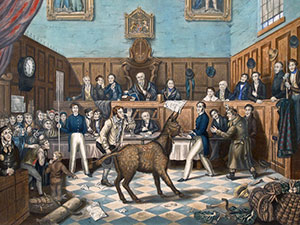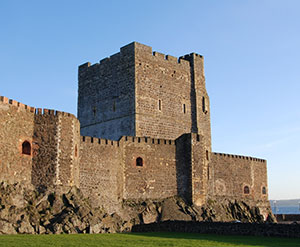ON THIS DAY
Published in Issue 1 (January/February 2020), News, Volume 28BY AODHÁN CREALEY
JANUARY
06/1834

Above: The Trial of Bill Burns—a painting showing Richard Martin with a donkey in an astonished courtroom, leading to the world’s first known conviction for animal cruelty.
Richard Martin (79), landowner and politician, died. Residing in Dangan House, some four miles upstream on the Corrib from Galway city, Martin, who sat in both the Irish House of Commons and the British House of Commons, was the owner of the largest estate in Ireland, some 200,000 acres. Renowned for his quick wit and humorous speeches, he was a noted duellist who survived over 100 duels with sword and pistol, an avid traveller who toured Europe and the Americas, and in politics a dedicated reformist who opposed slavery and supported Catholic Emancipation. On first-name terms with the great and the good, including the prince of Wales (later King George IV), who gave him the nickname ‘Hairtrigger Dick’, Henry Flood, Henry Grattan and Daniel O’Connell, he also knew a youthful Wolfe Tone, whom he employed to tutor his two younger half-brothers for an extended period in 1783 when Tone, coincidentally, was suspended from Trinity College for duelling. Though Tone at that time was obsessed with amateur dramatics and with Martin’s attractive wife, Eliza, with whom he appeared in Galway’s Kirwin Lane theatre in the comic drama All the World’s a Stage as a character who, ironically enough, attempts in vain to commit suicide, his employer may well have nurtured his political thinking. Today, Martin is best remembered for his private member’s bill ‘to prevent the cruel and improper treatment of cattle’, which became law in 1822 as ‘Martin’s Act’ and earned him the popular name ‘Humanity Dick’. He was also a co-founder of the Royal Society for the Protection of Animals (1824).
02/1920
Recruitment began of former British soldiers as reinforcements to the RIC under the command of Major-General H.H. Tudor; later dubbed the ‘Black-and-Tans’, they arrived in Ireland in late March.
04/1960
Albert Camus (46), Algeria-born French philosopher, writer and winner of the Nobel Prize in literature (1957), died in a car crash.
06/1980
The killing of three full-time UDR soldiers—Robert Smith (18), James Cochrane (21) and Richard Wilson (21)—in an IRA bomb attack near Castlewellan, Co. Down, brought the death-toll of the Troubles to 2,000.
10/1970
An estimated 6,000 attended an anti-apartheid demonstration outside Lansdowne Road as Ireland played South Africa in rugby.
09/1980
Taoiseach Charles J. Haughey gave his infamous ‘as a community, we are living beyond our means’ television address. Unknown to the public at the time, he owed the AIB £1.143m owing to persistent personal overspending.
10/1920
The League of Nations held its first meeting in Geneva. It was superseded by the United Nations on the same date in 1946.
11/1970
Following disagreement over the issue of parliamentary abstention, Sinn Féin split into Official and Provisional Sinn Féin, mirroring the split in the IRA a month previously.
16/1920
Prohibition came into force in the USA following ratification of the 18th amendment to the constitution.
17/1820
Anne Brontë, novelist, the youngest of the literary sisters, author notably of Agnes Grey (1847) and The tenant of Wildfell Hall (1848), born in Thornton, Yorkshire.
24/1920
Percy French (65), civil engineer, watercolourist and entertainer, died from pneumonia in Formby, Lancashire.
28/1970
Gerard Sweetman (61), Fine Gael politician and Minister for Finance (1954–7), was killed in a car crash in County Kildare.
30/1820
Edward Bransfield from Ballinacurra, Middleton, Co. Cork, commander of the English merchant vessel Williams, made the first sighting of the mainland of Antarctica—Trinity Peninsula, the northernmost point of the continent.
FEBRUARY
04/1177

Above: Carrickfergus Castle, Co. Antrim—one of two John de Courcy strongholds still standing today. The other is Dundrum Castle, overlooking Murlough Bay, Co. Down.
John de Courcy and his legendary ‘twenty-two mailed horsemen’, fellow knights in Henry II’s Dublin garrison, set out to invade Ulster. With guides and c. 200 foot-soldiers from the native Irish, he passed through Meath, proceeded through the Moyry Pass into Ulster and turned east. Four days later he reached his target—the settlement of Down (Downpatrick), capital of the kingdom of Dál Fiatach, ruled by Rory MacDonleavy. One can only wonder what MacDonleavy’s sentries made of the approaching invaders, the storm troopers of medieval Europe, warriors covered in armour from head to toe, seated in deep saddles with kite-shaped shields and lances under arm. In any event, MacDonleavy and his subjects promptly fled but returned a week later with a great host to meet de Courcy on a slope adjoining the River Quoile. What followed was a massacre. De Courcy, described by the Norman chronicler Gerald of Wales as ‘a born fighter, always in the front line, always taking upon himself the greater share of the danger’, was in the thick of the action, ‘wielding his sword with deadly accuracy, lopping off the heads, arms and hands of his adversaries’. By nightfall the Irish had been pushed back to the mudflats of the Quoile, where many sank, ‘the blood pouring from their wounds coming up to the knees and legs of their pursuers’. A few months later an even greater Ulster coalition failed to banish him. De Courcy was to rule most of modern east Down and east Antrim for a quarter of a century. His two principal castles still stand today—Dundrum Castle, overlooking Murlough Bay, Co. Down, and the magnificent Carrickfergus Castle.
03/1960
Conservative Prime Minister Harold Macmillan made his ‘Wind of Change’ speech in Cape Town, South Africa, acknowledging that Britain could no longer stand in the way of its African colonies’ self-determination.
05/1820
William Drennan (66), United Irishman, physician, co-founder of the Royal Belfast Academical Institution (1810) and poet, author of ‘The Wake of William Orr’, died.
14/1920
An IRA unit led by Eoin O’Duffy and Ernie O’Malley captured the RIC barracks at Ballytrain, Co. Monaghan, and seized all its arms and ammunition.
15/1970
Eoin ‘the Pope’ O’Mahony (66), barrister, genealogist and raconteur, died.
17/1820
Dan Donnelly, renowned Dublin-born pugilist whose victories included one over the English champion over eleven rounds—when a round lasted until one or other was thrown or knocked to the ground—at ‘Donnelly’s Hollow’ in the Curragh, at present marked by a small obelisk, died.
18/1920
Timothy Quinlisk, a Catholic ex-soldier and former member of Sir Roger Casement’s Irish Brigade, was executed by the IRA as a British spy in Ballyphehane, Co. Cork. Most IRA executions (66) during the War of Independence occurred in that county.
20/1920
Robert Peary (63), explorer and US Navy officer who, in 1909, became the first man to reach the North Pole, died.
24/1920
Nancy Astor, Unionist (now Conservative) MP, became the first woman to speak in Britain’s House of Commons.
25/1920
The Government of Ireland Bill, primarily an attempt to settle the Ulster question, was introduced in the House of Commons.
28/1985
Nine police officers were killed and 37, including 25 civilians, injured in an IRA mortar attack on Newry RUC station, the biggest single loss of police personnel during the Troubles.
29/1940
Gone with the Wind, an epic historical romance based on Margaret Mitchell’s 1936 bestseller, starring Vivien Leigh and Clark Gable, won ten awards, including best picture, at the 12th Academy Awards ceremony.
















